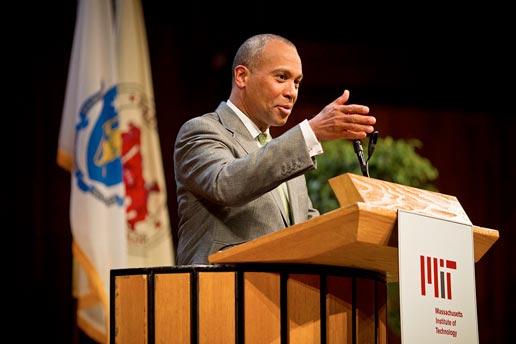
In an Earth Day address at MIT in 2008, Massachusetts Gov. Deval Patrick outlined an ambitious set of goals that he said could achieve significant reductions in greenhouse-gas emissions and create businesses and jobs based on clean-energy solutions. In a follow-up talk this week, he described a series of successes in achieving these goals.
“Five years ago,” MIT President L. Rafael Reif said in introducing Patrick, the governor “delivered an inspiring challenge: He argued that the commonwealth could improve its environment and its economy by leading the way in energy efficiency and clean-energy innovation.”
In the ensuing years, Reif said, Patrick delivered on that promise: “Today, thanks to his leadership, Massachusetts ranks first in the nation in state-level energy efficiency.”
In addition, Reif said, “Harmful pollution and emissions are both declining, and clean-energy jobs are on the rise. Massachusetts has proven by example that we can have a strong economy and a healthy environment.”
Patrick said that five years ago, “We in Massachusetts took a fresh look at our energy future.” He noted that “with no oil, coal or natural gas of our own, we are at the end of the pipeline and are subject to the whims of a global energy market.”
To address that, Patrick pushed for three pieces of legislation, he said: “First, the Green Communities Act enabled us to set ambitious goals for renewable energy: 250 megawatts of solar by 2017 and 2,000 megawatts of wind by 2020.” (The commonwealth had previously produced only 3 megawatts each of solar and wind energy, he said.)
The second piece of legislation, called the Global Warming Solutions Act, set a series of goals for reductions in greenhouse-gas emissions, calling for a reduction of 25 percent (from 1990 levels) by 2020, and a cut of 80 percent by 2050.
The third piece was the Green Jobs Act, aimed at “capturing the opportunities to foster innovation and create jobs,” Patrick said. Currently, 80 percent of money spent on energy in Massachusetts goes to out-of-state companies. But by creating new clean-energy businesses here, he said, “With the world in the midst of an energy revolution, we were convinced that if we got this right, the world would be our customer.”
In summarizing the outcomes of those actions, Patrick said, “I am here to report that it’s working.” For example, he said, “The American Council for an Energy Efficient Economy has ranked Massachusetts the No. 1 state in energy efficiency for two consecutive years — ahead of longtime leader California.”
The governor added, “We installed more than 100 megawatts of solar power last year alone — ranking us sixth last year in total capacity added.”
Not only has this been good for the environment, but it has been good business, he said: “There are nearly 5,000 clean-energy firms in Massachusetts today, employing some 72,000 people — an impressive 11.2 percent growth in jobs in just the last year.”
There’s more in store: With the nation’s first offshore wind farm about to be built in Nantucket Sound, and a test facility for turbine blades in Charlestown, he said, “The U.S. Department of Energy projects 20,000 jobs by 2020 in offshore wind. Why not host those jobs here in Massachusetts?”
Patrick also outlined a next crucial area of environmental sustainability: “We see water innovation as the next opportunity for Massachusetts to seize,” he said. “The same concentration of brainpower in this and other world-class universities and research facilities that spawned and feeds the life sciences and high-tech revolution in Massachusetts is at the center of this next big push in water innovation.”
Although the focus of the MIT Energy Initiative-sponsored talk was Earth Day and environmental issues, Reif’s introduction also alluded to the governor’s leadership since the Boston Marathon bombing. “I believe I can speak for the entire MIT community in saying thank you for your leadership over the past 10 days,” Reif said. “It has been a terrible and confusing time, and you offered calm, clarity, sympathy and reassurance.”
Patrick noted those events also, including his attendance at Wednesday’s memorial service: “Yesterday’s tribute to Officer Sean Collier was beautiful and fitting,” he said. But, he said, despite the tragic events, “One shining remnant of this experience has been the re-emergence of a strong sense of community, the notion of common stake and common cause.”
He said that in light of that, “I am convinced that there isn’t a single challenge that we face in this state or in this country that can’t be surmounted by a renewed sense that we have a stake in each other’s dreams and struggles.”
This article appears in the Spring 2013 issue of Energy Futures.